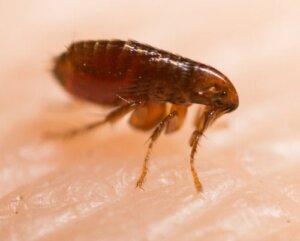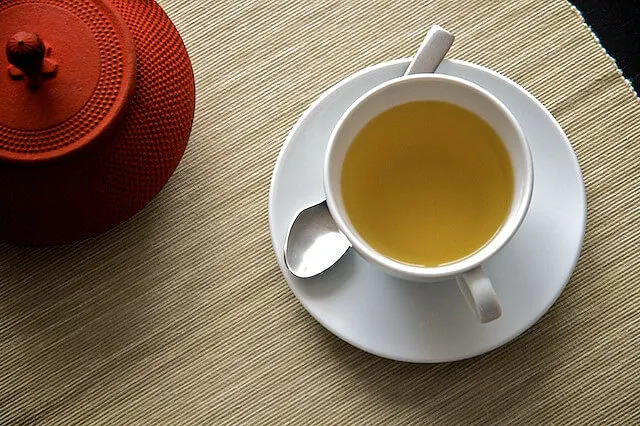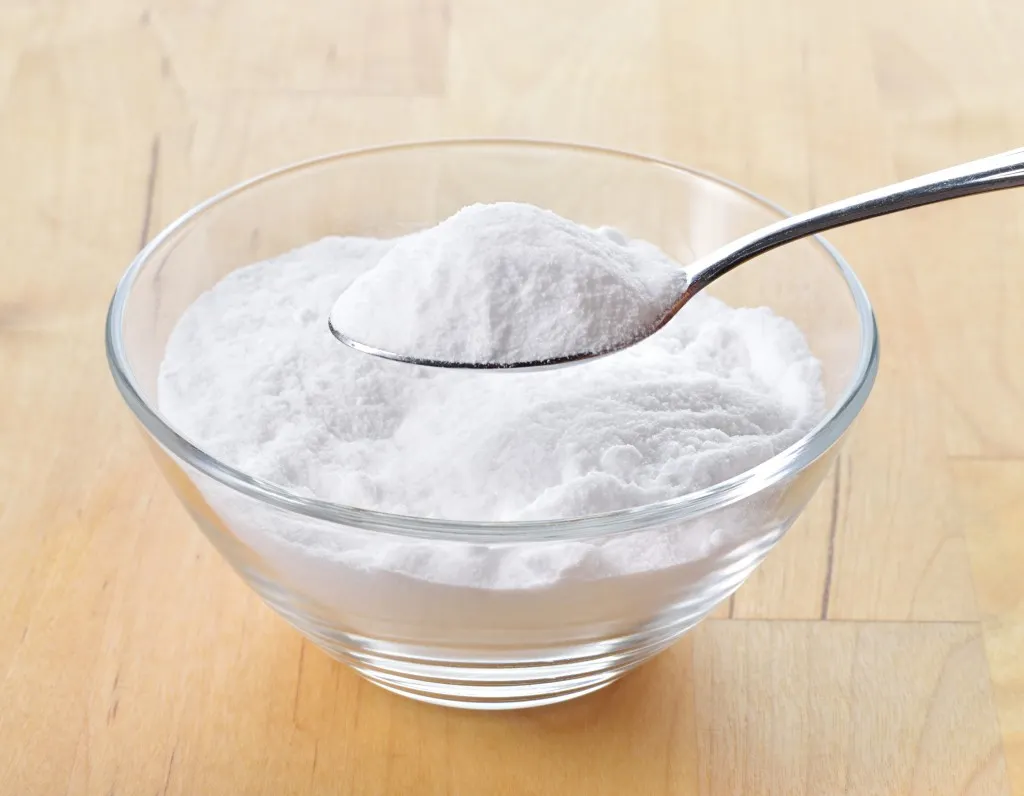Home Remedies for Flea Bites


Reviewed and approved by the doctor Mariel Mendoza
Although tiny in size, fleas can be a very annoying problem. These jumping insects feed on the blood of humans, dogs, cats, and other warm-blooded animals. Today, we’ll show you some home remedies for flea bites.
If you have a pet at home, you may have suffered more than once from flea bites, especially on the legs. As experts warn, most of the time they cause papular urticaria, an allergic reaction to insect bites and stings, although the truth is that they can generate more severe complications. Because of this, and apart from applying remedies for flea bites, you should implement a series of measures to avoid an episode in the future.
What are fleas like?
Before learning how to treat the bites of these parasites that commonly inhabit pets, it’s a good idea to know some of their characteristics. According to an article in the Electronic Journal of Veterinary Medicine, a flea is a very small insect, maximum 3.5 mm, which can jump to a height of 33 cm horizontally and 18 cm vertically.
As mentioned, it feeds on the blood of mammals, especially animals such as cats and dogs. As for their preferences, it seems that the type of blood, and body odor, among other things, make some people more prone to suffer from these bites.
Fleas have a resistant body, so they survive the nails of animals and also stay in places where they cannot be easily reached, for example, behind the ears or on the head. In humans, bites often occur on the legs and feet, the places closest to the ground.

A few seconds after the sting, the skin is usually inflamed, and this is made worse by constant scratching or failure to maintain proper hygiene in the area. Therefore, it’s important to keep the following steps in mind:
- Wash the area well with water and neutral soap.
- Dry with a cloth that does not release particles.
- Avoid scratching and apply a gauze or dressing that should be removed several times a day.
- Do not scratch the area around the bite.
We think you may also enjoy reading this article: Dengue Vaccine: Everything You Need to Know About It
Fleas are known to be a vector of diseases such as typhus, rickettsial disease, bubonic plague, protozoan, and helminth infestations. They can also cause dermatitis, and if not handled properly, episodes can develop into infections such as cellulitis and abscesses.
Natural remedies for flea bites
Although once the bite occurs there is not much you can do, the following natural remedies will help reduce the itching. This will keep you from scratching all the time and prevent infection in the affected area.
Aloe vera
One of the most commonly used remedies to soothe itching and burning is aloe vera. According to a review published in the Indian Journal of Dermatology, this plant has antiseptic, anti-inflammatory, and healing properties, among others. Therefore, it’s considered a very good option for flea bites.
What should you do?
- Cut a stem or stalk of aloe vera horizontally and place the gel part so that it comes into contact with the welt.
- Hold with gauze or tape for several minutes until the skin absorbs all the liquid.
Tea
The common tea used in infusions can also help relieve flea bites. Apparently, its anti-inflammatory and antibiotic effects are an effective remedy to mitigate itching and prevent infections. You can use other types such as black, green, lavender, or chamomile.
What should you do?
- Prepare the infusion as if you were going to drink it.
- Instead of drinking it, let it cool and then apply it with a gauze or cloth on the welt.
- If the infusion is in a sachet, you can leave it directly on the skin.

Medicinal plants
If you have basil or calendula leaves at home, don’t hesitate to use them to treat the inflammation caused by a flea bite. These plants usually have soothing effects and can be beneficial in these cases. It’s worth a try!
What should you do?
- Crush some fresh basil and calendula leaves with a little water or essential oil.
- Apply as a poultice.
Oats
Many are the properties attributed to oats for skin care. In the case of flea bites, an article from the American Osteophatic College of Dermatology states that topical antihistamines and antibacterials, combined with warm baths with an oatmeal solution, will help cleanse and soothe the itching.
What should you do?
- Put warm water in a bowl or fill the bathtub.
- Then, sprinkle a few tablespoons of oatmeal.
- Dip the affected area or apply with the help of a cotton ball, and leave for a few minutes.
Remedies for flea bites: Coconut
Although it’s not very common to use coconut in home remedies, this fruit is said to have anti-inflammatory and antibacterial activity. Hence, it can be useful in dealing with swelling, which shouldn’t take more than two days to go away if you use it in the right way.
What should you do?
- Cut a coconut in half.
- Then, extract the pulp and place it in a blender.
- Use this cream to apply directly on the bites.
- Rub a little and then wrap with a towel or cloth for an hour.
- Then, rinse with lukewarm water.
- Repeat twice a day.
Like this article? You may also like to read: Are You Cleaning Your Dog’s Food Bowl Enough?
Baking soda
While not recommended for daily use on the skin, the Mayo Clinic suggests that this ingredient can relieve redness, itching, and stinging caused by flea bites. Many over-the-counter creams contain baking soda. However, you can also make a paste at home.
What should you do?
- Place a tablespoon of baking soda and a few drops of water in a bowl.
- Mix well until you get a paste.
- Apply on the skin where the flea has bitten you and let it act for 15 minutes before rinsing.

Lemon peels
Lemons and their peels have beneficial health properties. In fact, a lemon peel is one of the most widely used natural remedies in popular culture to relieve itching caused by flea bites.
What should you do?
- In a saucepan, place a cup of water and the peel of a lemon. Boil for five minutes.
- Remove from heat and let stand until cool.
- Then, apply on the bite with the help of a cotton swab or gauze.
Remedies for flea bites: Honey
Honey is another option that can be beneficial if you have suffered from a flea bite. As a review published in Pharmacognosy Research indicates, this natural product has antimicrobial, anti-inflammatory, and healing properties.
What should you do?
- You can apply a little of this ingredient where the flea bit you, leaving it to act for a few minutes before washing it with warm water.
- Another option is to mix four tablespoons of honey with two tablespoons of lemon juice, heat in a saucepan, and let it cool to room temperature. Apply the ointment on the bite, hold it with gauze and leave for an hour.
Try these home remedies and you will notice the relief they provide. If you want to avoid being bitten by fleas, it’s important to maintain proper hygiene at home. However, above all, don’t forget to take the necessary measures to keep you and your pets clean and free of these insects.
All cited sources were thoroughly reviewed by our team to ensure their quality, reliability, currency, and validity. The bibliography of this article was considered reliable and of academic or scientific accuracy.
-
Anderson J, Paterek E. Flea Bites. In: StatPearls [Internet]. Treasure Island (FL): StatPearls Publishing; 2022 Jan.DebMandal M, Mandal S. Coconut (Cocos nucifera L.: Arecaceae): in health promotion and disease prevention. Asian Pac J Trop Med. 2011 Mar;4(3):241-7.
- García E, Halpert E, Rodríguez A, Andrade R, Fiorentino S, García C. Immune and histopathologic examination of flea bite-induced papular urticaria. Ann Allergy Asthma Immunol. 2004 Apr;92(4):446-52.
- Lisbet, García & E, Suárez & Fernández, Dr. (2010). Caracterización y control de especies de pulgas de importancia veterinaria para la salud animal y pública (Characterization and control of flea veterinary importance to animal and human health). REDVET. XI.
- Surjushe, A., Vasani, R., & Saple, D. G. (2008). Aloe vera: a short review. Indian journal of dermatology, 53(4), 163–166.
- Samarghandian, S., Farkhondeh, T., & Samini, F. (2017). Honey and Health: A Review of Recent Clinical Research. Pharmacognosy research, 9(2), 121–127.
- Sur R, Nigam A, Grote D, Liebel F, Southall MD. Avenanthramides, polyphenols from oats, exhibit anti-inflammatory and anti-itch activity. Arch Dermatol Res. 2008 Nov;300(10):569-74.
- Youssefi MR, Ebrahimpour S, Rezaei M, Ahmadpour E, Rakhshanpour A, Rahimi MT. Dermatitis caused by Ctenocephalides felis (cat flea) in human. Caspian J Intern Med. 2014 Fall;5(4):248-50.
This text is provided for informational purposes only and does not replace consultation with a professional. If in doubt, consult your specialist.








